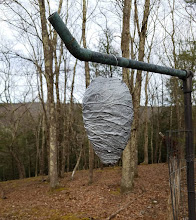Impinging Against an Array of Very Thin Tines
If I could just touch her wrist, without
her grabbing my hand. Mama bends backwards,
tweaking the lawn chair, gripping
the arms. She says the stars are twitchy
sequins on a black velvet ballgown.
Mama wishes on a sequin:
“ ........................................”
I don’t ask.
Mama has a name
she won’t use.
The fat man that used to live here,
he really gave it to her.
Made her cook Steak-umms and watch his T.V.
One night, when he flips
through the channels, Mama whispers,
“.......................................... ”
He took the dog, left
with his names still on her.
Mama’s new man
has a red beard,
wears a black hat,
won’t change his underwear. He says: “Shut up,
I don’t get dirty from sitting in a chair all day.”
Mama can’t sleep. She says
stars crumble down at night, leaves
all those twitchy sequins on her.
Mama gives me her old jewelry box
lined in black velvet and lint. It winds up
in the back, the coil releasing
hesitant pings.
Producing and Opening a Very Tiny Umbrella
Things accumulate:
Breakfast bowls, coffee
mugs, dinner plates, utensils.
I can’t keep wishing
all day and undoing
it every night, curled into
my tight hot portion of space.
In another room, our daughter is
watching cartoons; thwaps,
plunks, zoom whistles,
her giggles, hover
in spring cobwebs.
The faucet fills the sink.
The sponge is heavy with soap.
A papercut stings.
Water will always run
through my fingers, until drained
of feeling. If I could
scoop it up, screw down a lid,
I’d know
where the tears went.
The dishes are done
and now you show up
in the kitchen, wavin’ your
deedle-dee at me! My face
is intent on nothing,
not a wish, not a dare,
I just see It dangling—
Someone else has been with me
in a room with a desk,
in a room with a bed, someone
who touched my face
and everything that was not there
was at least felt
with just enough air
to make a sigh.
And now your brutal
knowledge of me collects
in the sounds of your mouth
so fast, your words are spaces
the pain slices through—
and through,
Reflections on the Motive Power of Heat
Everything in the universe, except
the system, is known as
surroundings. Noticed from the street,
is my kitchen window and I’m preparing
a dinner,
for two, maybe
three or four—
The system is separated from
the remainder of the universe
by a boundary. Wedged in
a small triangle
of space, between
stove, sink, refrigerator,
I’m balancing on the most exquisite
clay feet.
For closed systems, boundaries are real.
For open systems, boundaries are often
imaginary. I am waiting
on the porch; it’s much brighter
out here than I expected. Why do I
remember the arrow of time
more often as raining, when it was summer
twilight? With our quiet evening voices
and fireflies, whirling
like particles of lust
in the slanting light.
The possible exchanges of work, heat,
or matter take place across
a boundary. Darkness is delivered
to the ground: it could not be stopped.
Headlights pass my driveway, turn
down the street; someone passing by,
on their way to contentment
or disappointment.
The potential energy of a hairspring
works in any state of oscillation.
Tap/up/tap/down, I’m standing here
long after the view has changed,
attached to a linear spring.
If love is to be done
at a finite rate, free energy is subject
to an irreversible loss. There’s nothing
here that I don’t already
know, like vivid snapshots
waiting to be taken.
As time passes in an isolated
system, internal differences
tend to even out.
One weird little horn blare
happens for half a second—
ice melts, diluting
the water in my glass—
sliding on a rough surface, slowing
down rather than speeding up—
all measures of how far along
this evening-out process has progressed.
A certain amount of light is required
for the demon to "know"
the whereabouts of all the
particles in the system. In the noise
of crickets and a wobbly ceiling fan,
our molecules combined. Left alone,
they won’t separate out again.
The curves of my body press
into the muscle of his, rolled together
like a set of plans.
Quantum, in Latin, means how great?
Or how much? There’s the curve of his back,
bent over to lace up his boots. I think
over time, ignoring the effects
of self-gravity, differences in
temperature, pressure, and density
I’d be forgiven.
* title based on an 1824 book Reflections on the Motive Power of Fire and on Machines Fitted to Develop that Power, by French physicist Sadi Carnot, a preliminary outline of the Second Law of Thermodynamics

No comments:
Post a Comment